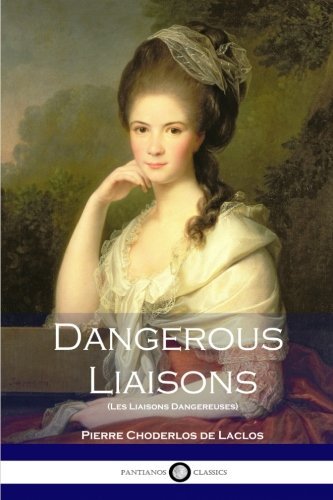Dangerous Liaisons

Rating: 4.4/5
Author: Pierre Choderlos De Laclos
Publisher: Durand Neveu
Publishing Date: 23 March 1782
Language: English
Genre: Epistolary Novel
ISBN-10: 9780140449570
ISBN-13: 978-0140449570
ASIN: 0140449574
Format: Paperback
Pages: 448
Cost: Rs. 103 (Kindle Edition)
Plot:
Published just years before the French Revolution, Laclos's great novel of moral and emotional depravity is a disturbing and ultimately damning portrayal of a decadent society. Aristocrats and ex-lovers Marquise de Merteuil and Vicomte de Valmont embark on a sophisticated game of seduction and manipulation to bring amusement to their jaded lives. While Merteuil challenges Valmont to seduce an innocent convent girl, he is also occupied with the conquest of a virtuous married woman. Eventually their human pawns respond, and the consequences prove to be more serious--and deadly--than the players could have ever predicted.
Review:
The plot of the book is set on ‘Desire’. Desire is not only the driving force in Dangerous Liaisons, but it is itself the most fancied artefact. The Vicomte de Valmont participates in this uncanny way of learning things. In Letter One Hundred and Ten, he describes Cécile's recent anatomy lessons in bed with him, in which he has taught her "a sort of debauchee's catechism" ("une espèce de catéchisme à débauche") to help her remember the names of all the important parts.
Religion is used as an metaphor to describe love, this is more true specifically in the case of Valmont; For example, Valmont accuses his Présidente of refusing to listen to his prayers, of punishing him unfairly for his misdeeds, and of averting her eyes from him like some unfortunate person one has no intention of assisting.
Valmont describes, in Letter Seventy-six, his arrival on the scene at Madame de Rosemonde's estate as: "In fact I dropped from the clouds, like a god in an opera who comes down to unravel the plot" ("En effet, je tombai des nues, comme une Divinité d'Opéra qui vient faire un dénouement"). ‘Opera’ was an important part of the daily life in the 18th century. Hence, the opera is presented as an underlying but a very important tool of metaphor.
Wayland Young notes that most critics have viewed the work as-
“A sort of celebration, or at least a neutral statement, of libertinism... pernicious and damnable... Almost everyone who has written about it has noted how perfunctory are the wages of sin..."
He argues, however, that:
“The mere analysis of libertinism… carried out by a novelist with such a prodigious command of his medium... was enough to condemn it and play a large part in its destruction.”
Film Adaptations:
- Les Liaisons Dangeruses (1959), directed by Roger Vadim.
- Une femme fidele (1976). A loose retelling also directed by Roger Vadim and set in 1870.
- Dangerous Liaisons (1988), directed by Stephen Frears.
- Valmont (1989), directed by Milos Forman.
- Cruel Intentions (1999), directed by Roger Kumble relocates the story to modern-day New York and is set amongst upper-class high school teens. This film spawned both a prequel in 2001 and a sequel in 2004.
- Untold Scandal (2003), directed by E J-yong transposes the setting to 18th century Korea.
- Dangerous Liaisons (2012), directed by Hur Jin-Ho.
About the Author:
Pierre Choderlos De Laclos (1741-1803) was born in Amiens. His family was respectable but not distinguished, and at eighteen he entered the army and spent the next twenty years in various garrison towns, and reached the rank of capitaine-commandant without ever seeing battle. He cut a dash in provincial society, however, and in his spare time wrote light verse, some of which was published. He wrote the libretto for Ernestine, a comic opera, which was produced in Paris in 1777, but was not received well. In 1779 he was sent to the island of Aix, off La Rochelle, where Les Liaisons Dangereuses was conceived and written. He went to Paris in 1781 to supervise the publishing of his book, overstayed his leave and was promptly ordered back to his regiment. He married Marie-Solange Duperre in 1786 and proved to be an exemplary husband and father. He left the army in 1788, entering politics, and was imprisoned twice during the Reign of Terror, but returned to the army as a general under Napoleon in 1800. He died in Italy in 1803. Laclos also wrote a treatise on the education of women and on Vauban. Towards the end of his life he was considering writing another one to show that true happiness could only be attained in family life.















































